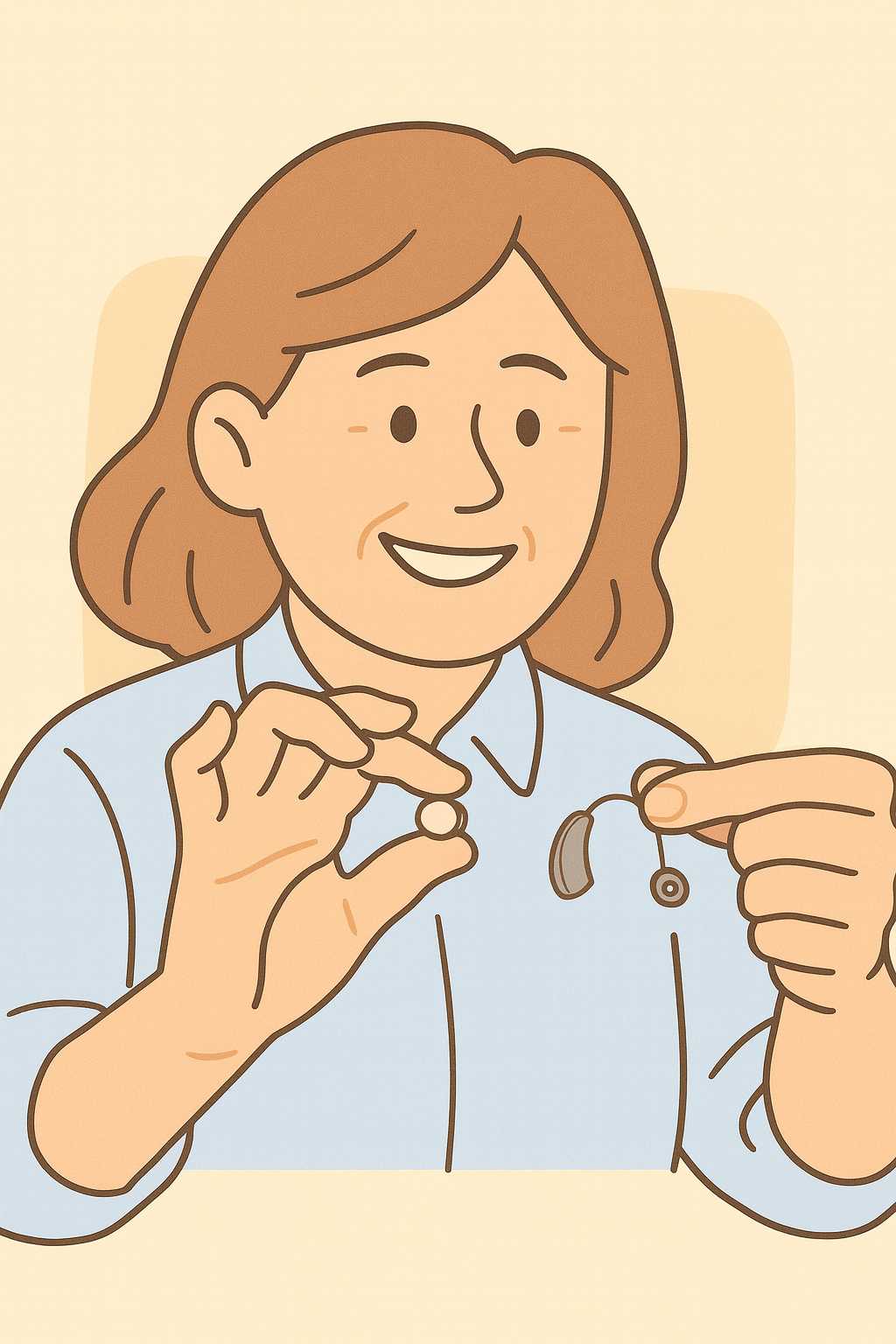
Rechargeable Hearing Aids vs Battery Powered Hearing Aids: A Comprehensive Guide to Choosing the Right Option
For hearing aid users, keeping the batteries fresh is critical to enjoying good sound. Hearing devices usually come with disposable or rechargeable batteries. Making the switch to rechargeable hearing aids can enhance your quality of life and give you an improved listening experience.
So how do you decide if rechargeable hearing aids are the right solution? This post will walk you through an overview of rechargeable hearing aids and a comparison with battery-powered hearing aids.
Key differences between rechargeable and battery-powered hearing aids
Battery-powered hearing aids:
- The recurring cost of buying batteries
- Batteries can get lost or damaged
- You need to carry extra batteries
- Less advanced models
- Disposable batteries damage the environment
- They are usually less expensive
Rechargeable hearing aids:
- You don’t need to buy batteries
- Built-in batteries
- More advanced models
- Eco-friendly
- More on the expensive side
What are battery-powered hearing aids?
The most common type of hearing aids. These hearing aids are inexpensive, making them a good option for users on a budget. However, the batteries don’t last long, so you must always carry spare batteries to change them. How often you change the batteries depends on the hearing aid model and the usage.
Until a few years ago, using a hearing device meant buying and carrying packages of disposable batteries. Besides being inconvenient and cumbersome, disposable batteries are bad for the environment. Thanks to technological advances, you can have a rechargeable hearing aid.
What are rechargeable hearing aids?
If you are looking for a hearing aid where you don’t need to remember to change batteries all the time, then a rechargeable hearing aid is a better option for you. These hearing aids are docked on a charger at night, much like a smartphone. The lithium-powered batteries don’t need to be replaced.

Standalone Phonak charger for rechargeable hearing devices.
Rechargeable hearing aids are best suited for people with mild-to-moderate hearing loss, although more advanced models are available for severe hearing loss. At Auzen, our expert audiologists can help you find the right rechargeable hearing aid for your case.
Advantages of rechargeable hearing aids
There are many benefits to rechargeable hearing aids, which explains their increasing popularity.
Comfort and convenience
Rechargeable batteries save users the hassle of constantly buying and carrying disposable batteries. They are already in the hearing aid; replacing them won’t be necessary even years into use. Also, they are optimal for people with dexterity issues who can’t fumble with replacing little batteries. That makes rechargeable hearing aids ideal for daily use.
Cost-savings in the long run
There are many benefits of not relying on disposable batteries. One of them is that it saves you money long term. Although more expensive than battery-powered hearing aids, rechargeable hearing aids save you money because you don’t need to buy expensive battery packages every week or month.
The batteries last longer
The battery life of rechargeable hearing aids is longer than that of disposable batteries. Most rechargeable hearing aids have a lithium battery that lasts 3 to 5 years or about 1000-2000 charge cycles. A charge cycle measures the time between fully charging a hearing aid and completely depleting it. How often do you need to charge rechargeable hearing aids? The battery life of rechargeable hearing aids can vary with the model and usage.
Environmental benefits of rechargeable hearing aids
Eco-friendly rechargeable hearing aids minimise environmental damage in the long run. Disposable batteries are highly toxic and an environmental hazard if you don’t dispose of them in a battery-recycling bin. When you use rechargeable batteries, you create less waste, and there is no need to dispose of any.
Types of rechargeable hearing aids
Rechargeable hearing aids provide a hassle-free experience, and as such, they have become more prevalent in recent years. You can find rechargeable hearing aids in different styles. Behind the ear (BTE), Receiver-in-canal (RIC), and Mini Receiver-in-canal (Mini RIC), there are also rechargeable hearing options for in-the-ear hearing aids.
At Auzen, our commitment to a greener future is only to sell rechargeable hearing devices.
User-friendly features of rechargeable hearing aids
Rechargeable hearing aids are typically more advanced than battery-powered ones and include improved battery technology. The durability of rechargeable hearing aids is longer, and they also include user-friendly features that provide enhanced comfort, such as advanced noise reduction, enhanced speech understanding in noisy situations and customisable settings.
There are rechargeable hearing aids for active lifestyles, like the Phonak Audeo Lumity L90, the first waterproof, rechargeable hearing aid. Or with wind noise reduction features such as the Oticon Mini Rite R.
Why are rechargeable hearing aids more expensive than battery powered?
Because of their advanced technology, rechargeable hearing aids fall into the mid to high-priced range of hearing aids. A rechargeable hearing aid typically has added features, such as Bluetooth connectivity, enhanced sound and even tinnitus management systems.
Choosing between rechargeable and battery-powered hearing aids
Rechargeable hearing aids show more user satisfaction because of the hassle-free experience and added features. Peeling the tab off the battery without dropping it and safely putting the tiny battery into the compartment may be difficult for some users. Many users, like 87-year-old Charles, with severe hearing loss to the point you can hear his TV on from downstairs, wouldn’t wear his hearing aids because he cannot change the batteries. Cases like Charles’ are more common every day.
How do you choose the right rechargeable hearing aid for you?
While this is a matter of preferences and lifestyle, here are some tips:
- Ask an expert audiologist: A trained audiologist is the smart option to recommend the best rechargeable hearing aid. They will analyse your audiogram, preferences, needs and lifestyle and recommend the right solution.
- Consider your lifestyle: Whether you have an active lifestyle, or you’re just looking for a convenient solution, a rechargeable hearing aid can improve your quality of life. Before choosing a hearing aid model, think about your daily activities. Do you spend a lot of time in noisy situations? Do you need to engage in multiple conversations with groups of people? Do you spend time outdoors?
- Buy the best for you, not the cheapest: Price can play a main role in your decision, but it shouldn’t. Prioritising price over features will only result in disappointment. Many times, when you look for budget options, you end up missing critical features that can improve your quality of life, like noise reduction in conversations or in the car.
Auzen’s commitment to a greener future
For eco-sustainability reason and because Auzen believes in a greener and less polluting future, we have decided to only sell rechargeable hearing aids.
So as not to penalise hard of hearing patients with pre-existing non-rechargeable hearing aids, we also provide battery replacements for battery-powered hearing devices.
FAQs
How long do batteries in rechargeable hearing aids last?
Most rechargeable hearing aids are designed to last a full day of normal usage with each charge. The idea is that the batteries will be charged overnight while you sleep. Some activities, such as streaming audio from the TV or music, can strain the battery and shorten its duration.
Are rechargeable hearing aids more convenient than traditional battery-powered hearing aids?
Rechargeable hearing aids are more convenient than battery-powered hearing aids, sparing the wearer from the hassle of carrying around spare packs of batteries or trying to replace tiny batteries. The only minor downside is that you must charge them every night and travel with your charger unit.
Does Swiss social insurance cover rechargeable hearing aids?
Hearing aids purchased under Auzen service enjoy some coverage by social insurance, such as the OASI and DI. They reimburse up to 85% of the purchase price, thus covering most of the cost.
For more information about Swiss Social Insurance coverage, see our dedicated page here.
Sources :
- American Speech-Language-Hearing Association (ASHA) - www.asha.org
- National Institute on Deafness and Other Communication Disorders (NIDCD) - www.nidcd.nih.gov
- Mayo Clinic - www.mayoclinic.org
- American Academy of Audiology (AAA) - www.audiology.org
- Hearing Loss Association of America (HLAA) - www.hearingloss.org
- Centers for Disease Control and Prevention (CDC) - www.cdc.gov/hearingloss
- Better Hearing Institute (BHI) - www.betterhearing.org
- British Society of Audiology (BSA) - www.thebsa.org.uk
- European Association of Hearing Aid Professionals (AEA) - www.aea-audio.org
- Healthy Hearing - www.healthyhearing.com
- Hearing aids comparator www.hearingtracker.com

Leave a comment
This site is protected by hCaptcha and the hCaptcha Privacy Policy and Terms of Service apply.